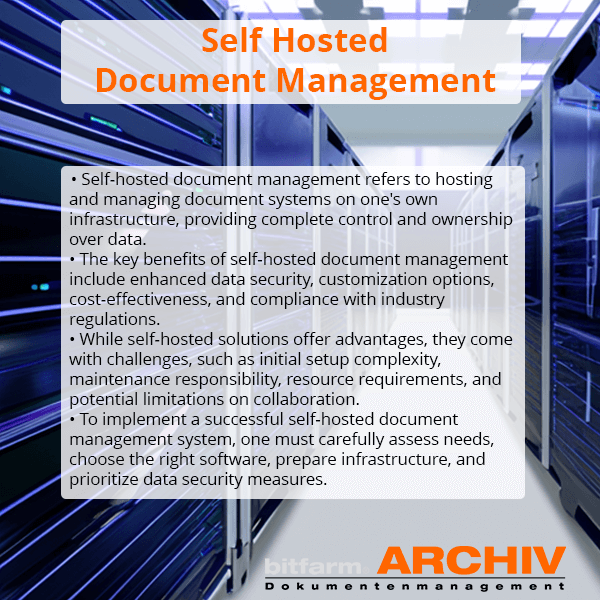 …don't search – find!
…don't search – find!
Did You Know...?
Self-hosted document management involves hosting and managing systems on private infrastructure, providing control over data.
Benefits include enhanced security, customization options, cost-effectiveness, and compliance capabilities.
Successful implementation requires assessing needs, choosing suitable software, preparing infrastructure, and prioritizing data security.
Contents

Data security is a top priority for any organization, regardless of its size or industry. Self-hosted systems offers a higher level of control and security compared to cloud-based alternatives. By hosting the system on your servers, you can implement robust security measures, including firewalls, encryption, and access controls, safeguarding your sensitive information from unauthorized access and potential data breaches.
One of the significant advantages of self-hosted document management is the ability to tailor the system to meet your specific requirements. Unlike cloud-based solutions, which may limit customization options ,on-premises software allows you to modify the software and features to align perfectly with your organization's needs, ensuring maximum efficiency and productivity.
While cloud-based DMS may appear cost-effective initially, the long-term expenses can escalate as your data storage needs grow. Self-managed software eliminates the need for recurring monthly fees, making it a more cost-efficient option in the long run. Additionally, you can choose the hardware and hosting provider that suits your budget and scale as your organization expands.

While self-hosted document management provides numerous benefits, it also comes with certain challenges:
Setting up a on-site hosted system require technical expertise and careful planning.
You're responsible for system maintenance, including updates, backups, and security patches.
Depending on the scale of your operation, local-hosting may demand significant hardware and bandwidth resources. Take a look for our recommendations regardings server ressources.
Collaborating with external stakeholders might require an access which has to be set-up.
Effective document management in a self-hosted environment requires adherence to best practices:
Regularly back up your DMS data to prevent data loss in case of hardware failures or other unforeseen events. Implement data protection measures to secure your documents from accidental deletion or corruption.
Also provide comprehensive training to all users to ensure they are proficient in using In-house hosted software.
Consider offering ongoing support to address any issues or questions that may arise during day-to-day operations. Regarding Document Lifecycle Managament, you should establish clear guidelines for document retention and disposal.
Implement policies that outline when and how documents should be archived or deleted, ensuring a clutter-free and organized DMS.
Lastly, regularly monitor user activity and access logs to identify any suspicious behavior or security breaches. Conduct periodic audits to ensure compliance with data management policies and industry regulations.
Are you interested in more information about the topic of self-hosted document management?